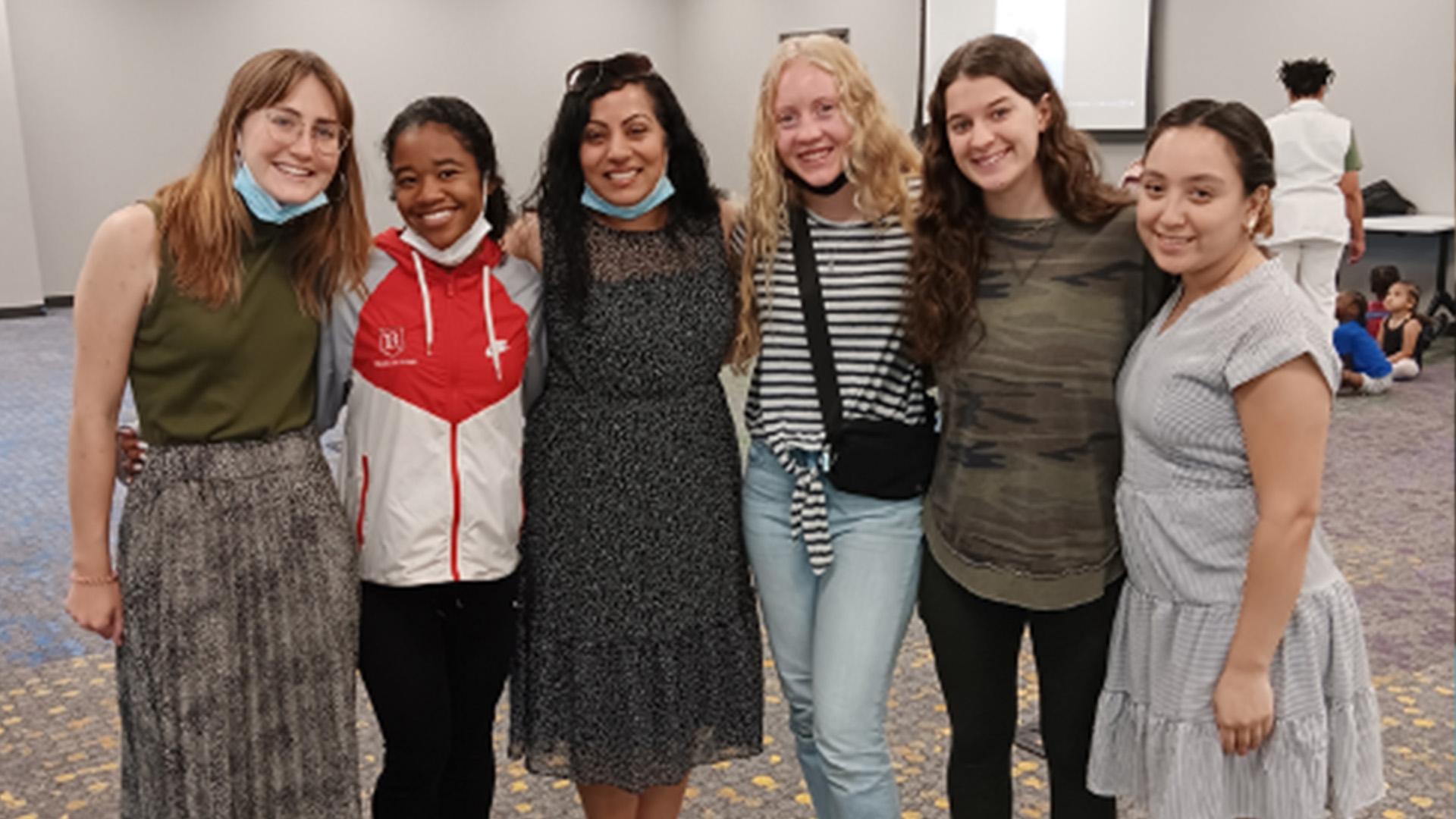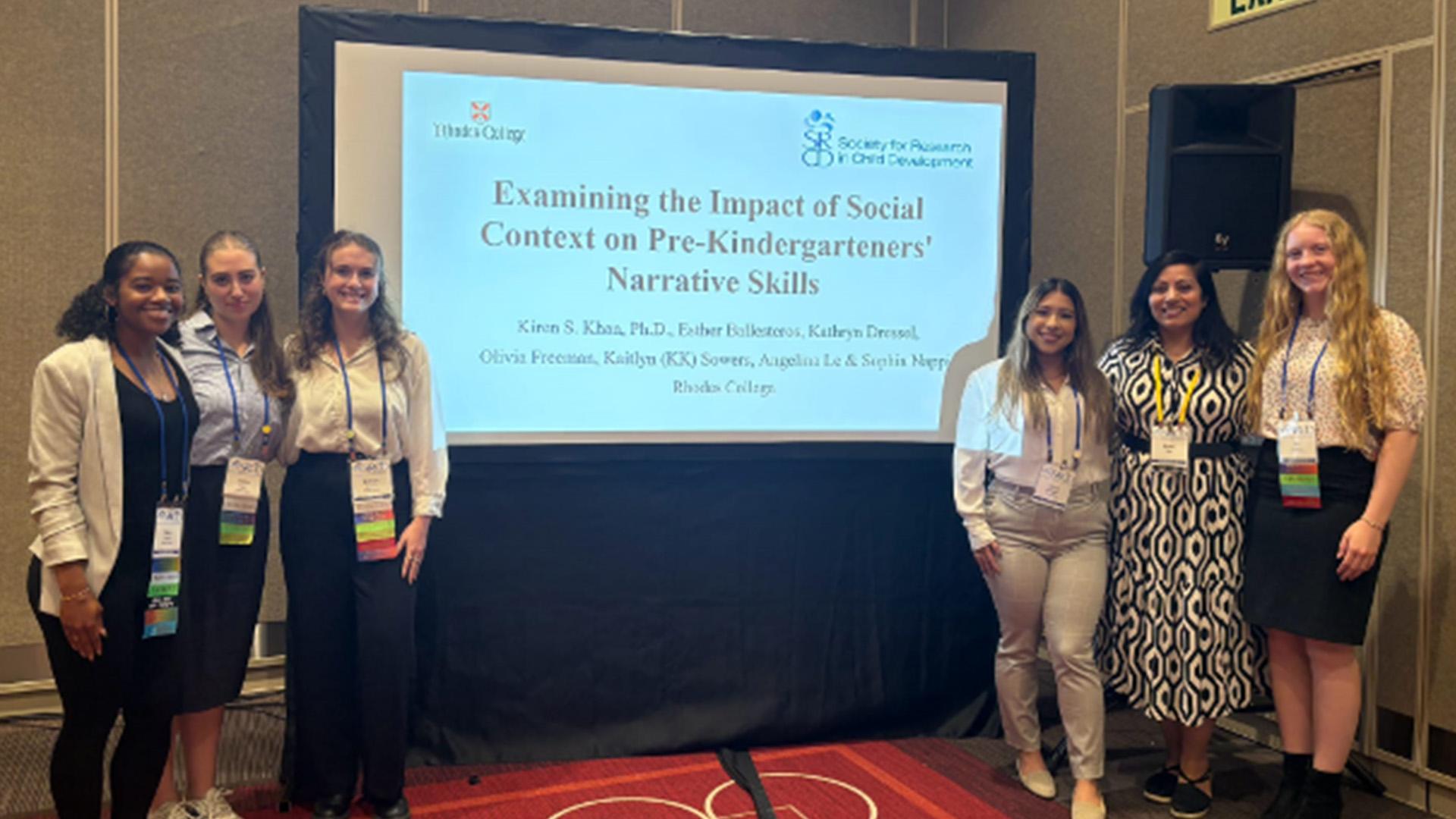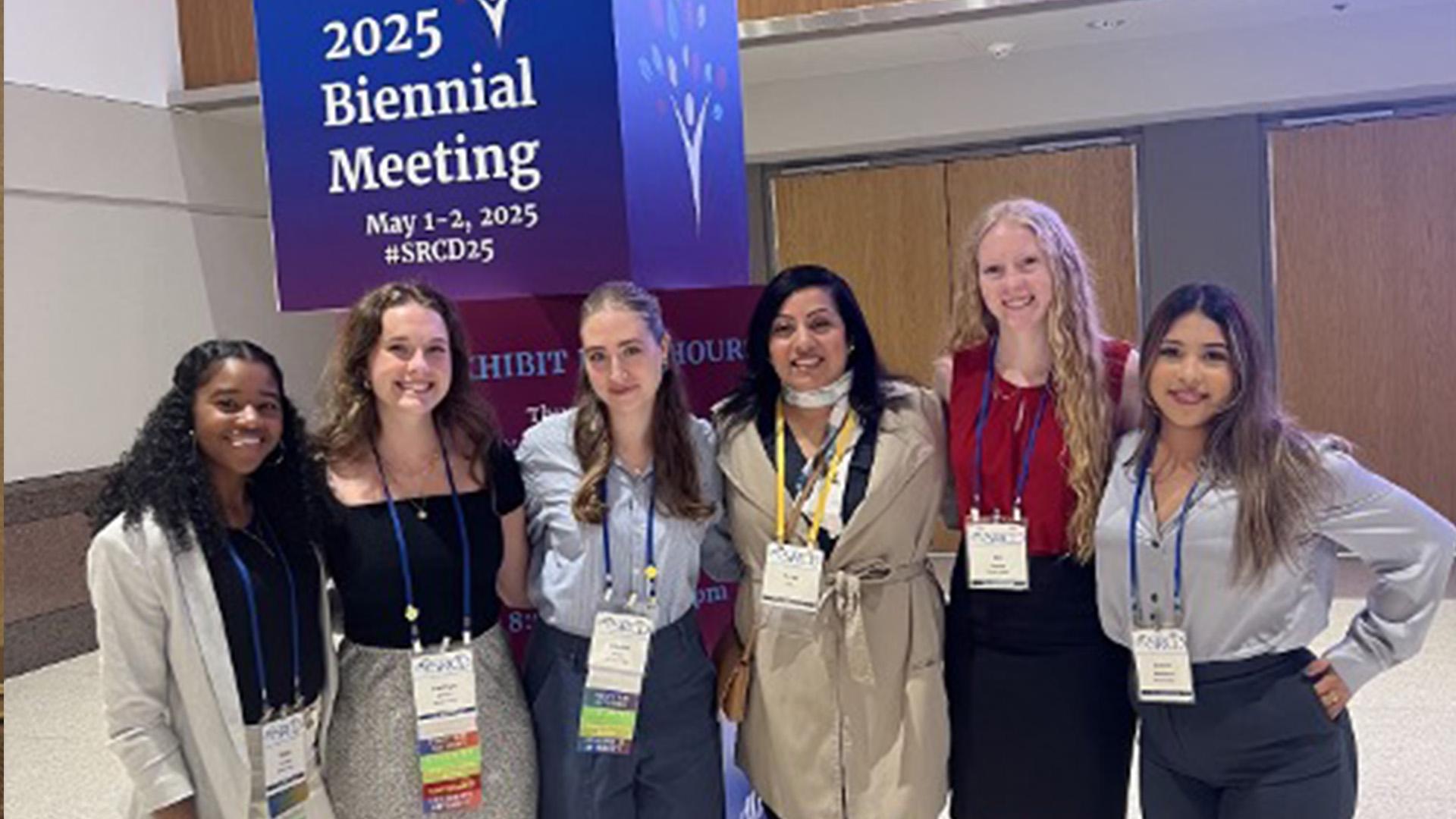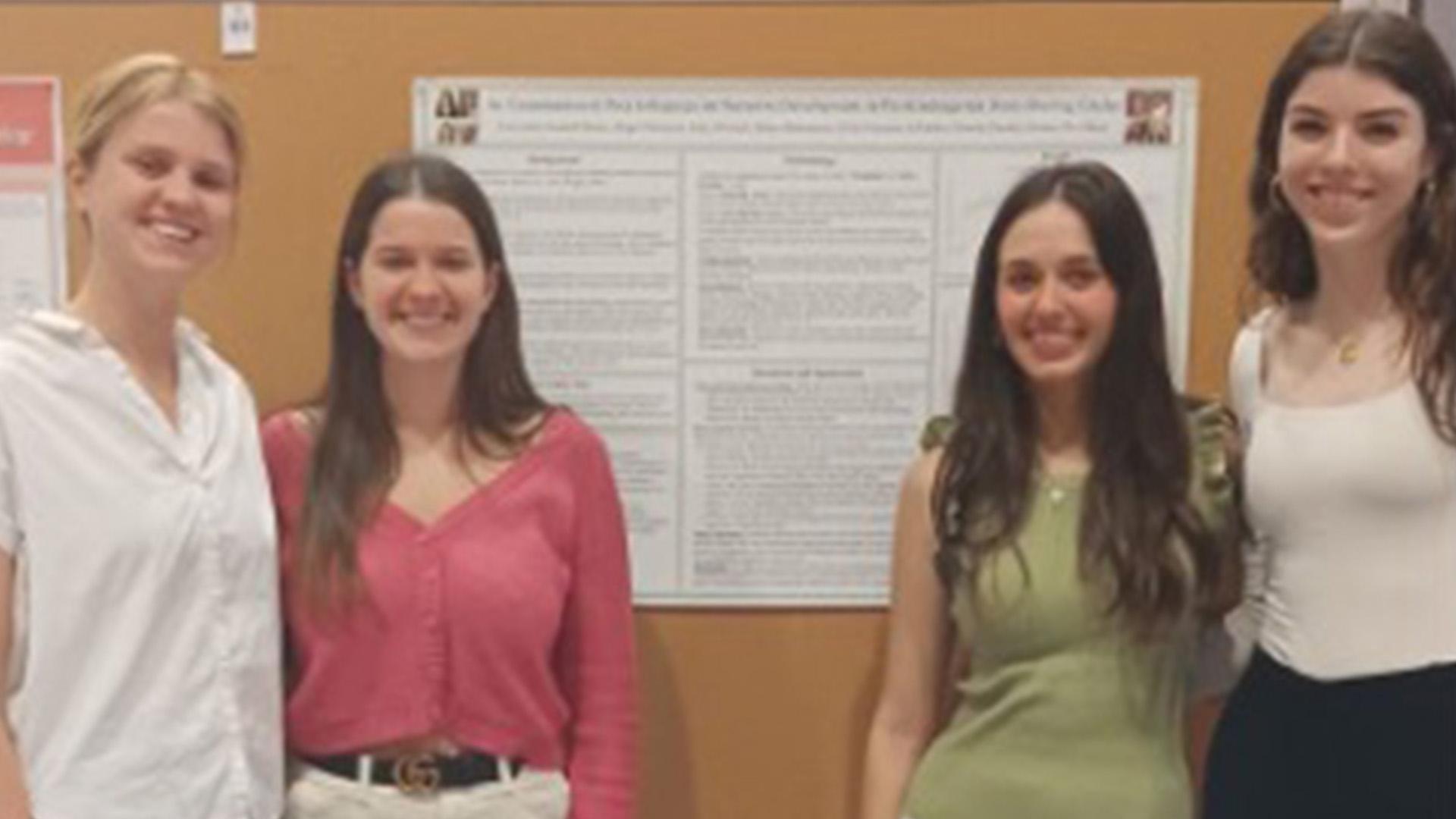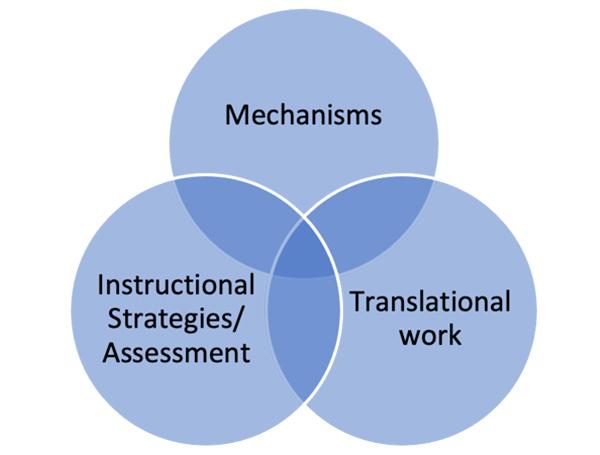
The Language and Literacy Lab at Rhodes College explores three interrelated areas of language and narrative development. First, the lab investigates the cognitive and social mechanisms that support children’s narrative development, contributing to theoretical models that explain individual differences in these skills. Second, the lab conducts applied research focused on identifying and testing effective instructional strategies to support narrative competence. Third, the lab engages in translational research, including the design and evaluation of kindergarten readiness programming that applies evidence-based techniques to foster rich language, narrative, and early reading skills in young children.
A central emphasis of this translational work is a strengths-based, culturally responsive approach to supporting kindergarten readiness, particularly in the areas of narrative and emergent literacy development.
Undergraduate students in the Language and Literacy Lab gain hands-on experience across all phases of the research process—from conceptualizing research questions and developing study protocols and materials, to collecting and analyzing data. Students also have opportunities to present findings at national and international conferences and to contribute to scholarly manuscripts prepared for publication. Lab alumni have gone on to pursue advanced degrees in developmental and educational psychology, clinical psychology, speech-language pathology, clinical mental health, nursing, and law.
Mechanisms Supporting Narrative and Literacy Development
Research in the Language and Literacy Lab explores theoretical and mechanistic questions related to the development of narrative and reading skills in early childhood. This work examines the foundational language skills that contribute to narrative ability, as well as the ways in which narrative development may interact with growth in other cognitive and academic domains, such as early math and self-regulation.
Ongoing studies also investigate how early narrative skills contribute to emergent literacy outcomes and how individual differences in language and attention profiles relate to reading development. In addition to empirical research, the lab contributes to theoretical scholarship that offers developmental models of narrative growth, emphasizing how narrative skills can be supported and enhanced from early to middle childhood. This includes work that takes a long-term, integrative perspective on how to foster early language and literacy by connecting instructional practices across preschool and the early elementary years.
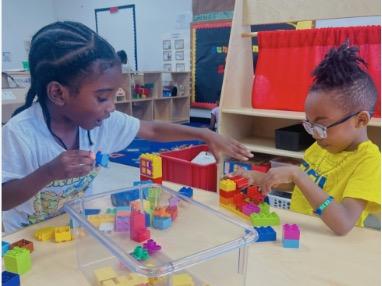
Translational Research
A central component of the Language and Literacy Lab’s research program involves the ongoing development and implementation of Summer Success, a kindergarten readiness program developed in collaboration with lead researchers in the field (see Justice et al. 2017 for program manual) and offered in collaboration with Porter-Leath, a Memphis-based early childhood organization. Designed to support children’s transition to kindergarten, the program integrates activities that build narrative and literacy skills alongside socioemotional, mathematical, and motor development. Data from program implementation across multiple years indicate that children participating in the four-week Summer Success program show significant gains in all areas of school readiness.
Undergraduate research fellows at Rhodes College support the implementation of this research-based summer camp each year and gain valuable, hands-on experience with data collection and assessment, assisting licensed lead teachers in a prekindergarten classroom, and implementation of program curriculum and research protocols.
Conference Presentations (*indicates student mentee)
Khan, K.S., *Ballesteros, E., *Dressel, K, *Freeman, O., *Sowers, K., *Le, A. & *Nappi, S. (May, 2025). Examining the Impact of Social Context on Pre-Kindergartners’ Narrative Skills. In K. S. Khan (Chair), Culturally-Relevant Approaches for Examining and Supporting Narrative Development in Young Children. Symposium conducted at the Society for Research in Child Development, Minneapolis, MN.
Khan, K.S., *Ashe, A., *Hultquist A., *Mitchell, A., *Ballesteros, E., *Freeman, O., *Nappi, S., & *Dobie, K. (July, 2024). An Examination of Peer Influences on Narrative Development in Pre-Kindergarten Story-Sharing Circles. Paper presented in symposium session at the International Association for the Study of Child Language, Prague, Czech Republic.
Khan, K.S., *Ashe, A., *Hultquist A., & *Mitchell, A. (April, 2024). Creating Affiliative Story-Sharing Communities in Preschool Classrooms: The Impact of Peer Groups on Narrative Development. Poster to be presented at the American Educational Research Association, Philadelphia, PA.
Khan, K.S., *Hultquist, A., & *Dempsey, A. (March, 2023). Examining the Impact of Peer Groups on Children’s Narrative Development: Indexing the Creation of a Story-Sharing Community. In K. S. Khan (Chair), Strengths-Based Approaches for Examining and Supporting Narrative Development in Young Children. Symposium conducted at the Society for Research in Child Development, Salt Lake City, UT.
Khan, K.S., *Rosas, L., *Blais, E., *Houle, V., *Hultquist, A., & Walton, M.D. (April, 2022). "But I think that she left because she thought that I was following her, but I wasn't.":
The Impact of Story-Sharing Circles on Preschoolers' Character Representation. Poster presented at the Cognitive Development Society, Madison, WI.
Khan, K.S., Walton, M.D., & *Chavers, A.L. (July, 2021). The Impact of a Classroom-based, Story-Sharing Intervention on Children's Understanding of Internal State Language and Negative Emotion Resolution. Poster presented at the International Association for the Study of Child Language (virtual).
Khan, K.S., *Leland, E.E., *Schoel, M.E., *Duncan, T.R., *Rosas, L.E, & Walton, M.D. (April, 2021). Story-Sharing Circles as a Strengths-Based and Culturally-Sensitive Approach in Supporting Preschool-Aged Children’s Narrative Skills. Paper presented at the American Educational Research Association (virtual).
Walton, M.D., *Duncan, T.R., *Schoel, M.E., *Rosas, L.E., *Leland, E.E. & Khan, K.S. (April, 2021) “I don’t wanna throw it out the window!” Dialogue as Cultural Strength in Preschool Narratives. Paper presented at the American Educational Research Association (virtual).
Khan, K.S., *Schoel, M.E., *Leland, E.E., *Duncan, T.R., *Rosas, L.E., & Walton, M.D. (April, 2021). The Impact of Story-Sharing Circles on Preschoolers’ Elaboration and Resolution of Negative Emotional Experiences. Poster presented at the Society for Research in Child Development (virtual).
Khan, K.S., *Hoyt, A., *Tameez, S., *Chavers, A, & *Muniz, B. (March 2019). Demonstrating the Efficacy and Scalability of Summer Success, a Comprehensive Kindergarten Readiness Program. Poster presented at the Society for Research in Child Development, Baltimore, MD.
Select Publications in Peer-Reviewed Journals
Khan, K.S., *Duncan, T., & *Schoel, M. (in submission). Demonstrating the Efficacy and Scalability of the Summer Success Kindergarten Readiness Program.
Khan, K. S., Hong, F., Justice, L. M., Sun, J., & Mills, A. K. (2021). Cross-domain associations between mathematical and narrative abilities in preschool-aged children. Journal of Experimental Child Psychology, 212, 105233.
Khan, K. S., Logan, J., Justice, L. M., Bowles, R. P., & Piasta, S. B. (2021). The contribution of vocabulary, grammar, and phonological awareness across a continuum of narrative ability levels in young children. Journal of Speech, Language, and Hearing Research, 64(9), 3489-3503.
Piasta, S. B., Sawyer, B., Justice, L. M., O’Connell, A. A., Jiang, H., Dogucu, M., & Khan, K. S. (2020). Effects of Read It Again! in early childhood special education classrooms as compared to regular shared book reading. Journal of Early Intervention, 42(3), 224-243.
Bowles, R.P., Justice, L.M., Khan, K.S., Piasta, S.B., Skibbe, L.E., Foster, T., & Samples-Steele, C. (2020). Development of the Narrative Assessment Protocol (NAP-2): A Tool for Examining Young Children’s Narrative Skills. Language, Speech, and Hearing Services in Schools, 51(2), 390-404.
Piasta, S. B., Groom, L. J., Khan, K. S., Skibbe, L. E., & Bowles, R. P. (2018). Young children’s narrative skill: concurrent and predictive associations with emergent literacy and early word reading skills. Reading and Writing, 1-20.

A recent honors thesis by Kaitlyn (KK) Sowers in the Language and Literacy Lab explores how social context influences young children’s narrative abilities, specifically in terms of how they elaborate on characters’ thoughts, feelings, intentions, and perspectives. The study compares children’s storytelling in small-group, peer-based story-sharing circles to one-on-one adult-led sessions, analyzing differences in narrative structures and social-cognitive features such as references to internal states, character perspectives, and emotion/ conflict arcs within stories. This work contributes to our understanding of how interactive, peer-mediated, emotionally-themed storytelling environments can support children’s narrative development, social cognition and school readiness.
